The Blind Goddess Read online
Page 10
He ought to be able to answer. He missed her involvement, and he began to see why. He lacked the experience of direct leadership of an investigation; even though he was formally responsible for all the cases in his name, it was rare for any of the police lawyers to take a direct part as he was now doing.
“I have to admit that was something I didn’t think of,” he said.
“It’s not too late,” she consoled him. “You can still check it out.”
He accepted her reassurance, and to make up for his dwindling reputation as an investigator he told her about his enquiries on the subject of Jørgen Ulf Lavik.
Lavik had been fairly successful in quite a short time. After a couple of years with Peter Strup he had started up his own firm with two newly established lawyers about the same age as himself. They covered most aspects of the law, and Lavik himself had a caseload that was about fifty percent criminal with the other half spread over middle-ranging commercial law work. He had acquired a second wife, and had three children with her in quick succession. The family lived in a modest terraced house in quite a respectable part of the city. Their spending didn’t seem on first appraisal to be any more than a man such as Lavik would be able to afford: two cars, a one-year-old Volvo, and a seven-year-old Toyota for his wife. No summer cottage, no boat. Wife at home, necessarily so, of course, with three boys of one, two, and five.
“Sounds like a pretty typical Oslo lawyer,” said Hanne in a resigned tone. “Tell me something I don’t know, pal.”
Håkon thought she seemed exhausted. Her breath in the cold air was getting visibly faster, even though they’d been sitting still for a while. He stood up, brushed his hands over the back of his trousers as if to wipe off imaginary snow, and stretched out his hand to help her up. It was unnecessary, but she accepted it.
“Look into the commercial side of his activities,” she instructed her superior. “And get a list drawn up of all his criminal clients over the last few years. I bet we’ll find something or other.
“And also,” she added, “put the cases together now. They’re mine, both of them, I had the first one.”
She looked almost joyful at the thought.
MONDAY 19 OCTOBER
It was only eight days since Hanne Wilhelmsen’s brutal encounter with her attacker. She should have been on sick leave for at least another week. Considering the way she felt, she had to admit it would have been more sensible. She still had a slight headache, and was subject to episodes of giddiness and nausea if she overexerted herself. But she swore to everyone, including Cecilie, that she was in perfect condition. Just a bit tired. She consented to take half time off sick for a week.
She was greeted by applause when she went into the combined lunch and meeting room, and felt extremely self-conscious. But she smiled and shook all the extended hands. There were a few comments about her hairstyle; she parried the friendly teasing with self-irony, and everyone laughed. She was still wearing sticking plasters, and the lower part of her face was displaying various shades of yellow and green. That protected her from hugs, until the superintendent entered the room, threw his arms round her shoulders, and gave her an exuberant embrace.
“What a girl!” he bellowed into her ear. “My God, Hanne, you gave us all a fright!”
Hanne had to reiterate her insistence that she was fine, and promised to deliver the report he was expecting. They agreed on a time and place, and Chief Inspector Kaldbakken concurred.
Suddenly Billy T. was standing in the doorway. At six foot eight plus boots, his shaved head touched the lintel. Despite his broad grin, he was an intimidating sight.
“KO’d in the first round, Hanne? Thought you’d have been able to look after yourself better than that,” he said, in a tone of mock disappointment. He had trained Hanne in self-defence himself.
“Are you going to sit there all day letting them sing your praises, or have you got a few minutes for some real work?”
She had indeed. Her desk was dominated by a huge bouquet of flowers. It was beautiful, but the vase rather spoilt the effect. It wasn’t big enough either, and when she lifted it carefully to carry it to the windowsill the whole lot toppled over. The vase slipped out of her grasp and crashed to the floor. Flowers and water went everywhere. Billy T. roared with laughter.
“You see what happens when we show a bit of appreciation here in the office,” he said.
He pushed Hanne aside, scooped up the flowers in one gigantic hand, and tried to sweep the water to the wall with his boots. Ineffectually. He sat down, tossing the flowers into a corner.
“I think I’ve got something for you,” he declared, pulling out two pieces of paper from his back pocket. They were curved to the shape of his buttocks, like a man’s wallet. They’d obviously been there some time.
“Seized last week,” he said, as Detective Inspector Wilhelmsen unfolded them. “When we raided an apartment. Second time lucky. Twenty grams of heroin, four grams of cocaine. But it really was a stroke of luck, we’d only nabbed him for minor offences before. Now he’s down below gnashing his teeth.” He waved his arm with a flourish towards the window, indicating the rear of the building.
“And he’ll be staying there till the main hearing, you can be sure of that—which may take a while,” he added in a tone of great satisfaction.
The two sheets were very similar to the piece of paper from Olsen’s porn video. Nothing but rows of figures, in groups of three numbers. Both were handwritten, and headed respectively “Borneo” and “Africa.”
“He’s singing like a lark, but he’s sticking to his story that he doesn’t know what these signify. We’ve been pushing him pretty hard, and he’s given us a whole lot of useful information. More than necessary, in fact. Which makes me wonder whether maybe he’s telling the truth when he says he’s got no idea what the numbers mean.”
They sat staring at the pieces of paper as if the secret would suddenly jump out and hit them right between the eyes if they concentrated hard enough.
“Did he say anything about how he’d got hold of them?”
“Yes, he maintains that he came across them accidentally, and that he kept them as a kind of insurance. We couldn’t get any more out of him, not even what he meant when he said ‘accidentally.’”
Hanne noted the strange texture of the paper. It had a powdery coating, with a few scattered fingerprints faintly delineated in pale mauve.
“I’ve already had them tested for prints. Nothing of any use there,” Billy T. volunteered.
He took the sheets from her and left the room, returning a couple of minutes later and handing her a copy of each, still warm.
“I’ll keep the originals. You can have them if you need them.”
“Thanks, Billy.”
Her gratitude was genuine, despite her weary smile.
First she assured him that he was a witness, not a suspect. That scarcely made any difference to him, since he was already charged on another matter anyway. Then he was given a Coca-Cola, which he’d requested. He’d been allowed to have a shower before coming up. Hanne Wilhelmsen was friendly and open, and managed to indicate obliquely that a suspect in one case would benefit from being a good witness in another. He was not noticeably impressed. They made small talk. The break from the boredom of his cell was welcome; he looked as if he was actually enjoying himself. Hanne was not. Her headache was bad, and when she winced at the pain the stitches in her wounds pulled and made it worse.
“I realise I’ll get several years for this.”
He seemed more confident than Billy T. had implied.
“I might as well admit it to you: I’m not very interested in your own case. That can stay yours. I want to talk to you about the documents that were found on you.”
“Documents? They weren’t documents. They were bits of paper with numbers. Documents have rubber stamps and signatures and things.”
He’d already drunk one bottle of Coke, and asked for another. Hanne pressed the buttons on the intercom a
nd ordered it.
“Room service! Marvellous! Nothing like that where I am, you know.”
“These documents, or sheets of paper,” she tried again, but was interrupted.
“No idea. It’s the truth. Found them somewhere. Kept them just as a sort of insurance policy. You can’t be too careful in my line of business, you know.”
“Insurance against what?”
“Just insurance, not for anything special. Have you been beaten up, or what?”
“No, I was born like this.”
After three hours’ work she was beginning to understand why the doctor had been so adamant that she should continue her sick leave. Cecilie had warned her about the headaches and the nausea, had outlined frightful scenarios of how everything could become permanent if she didn’t take it easy. Hanne was beginning to think her partner might be right. She gently massaged the temple that wasn’t plastered up.
“Can’t say anything, you see.”
He suddenly seemed a little more amenable. His bony frame was trembling, and he spilt some Coke as he tried to drink from the new bottle that had arrived within minutes.
“Withdrawal symptoms, you see. Ought to get me over to the prison. Plenty of dope there, you know. Couldn’t you organise something for me?”
Hanne Wilhelmsen looked at him. Pitifully thin and pale as a ghost. His scanty beard wasn’t sufficient to conceal all his spots; he had abnormally bad skin for a man over thirty. He must have been handsome once. She could imagine him as a five-year-old, dressed up for a photograph in a sailor suit and gleaming curls—a sweet child. She’d heard the lawyers at police headquarters complaining contemptuously about all the nonsense put forward by defence counsel. Wretched childhood, let down by society, drunkard fathers, mothers who drank a bit less to keep themselves just sober enough to prevent the child being taken into care, until by the age of thirteen it was totally uncontrollable and beyond all assistance from the child care authorities or any other well-meaning souls. They didn’t stand a chance. Hanne knew the defence lawyers were right. She’d long realised that with ten years of frustration behind you, there was more than enough reason to turn bad. They’d all had a hell of a life. This guy too, presumably.
Like a thought-reader he started to whine in a quavering voice, “I’ve had a hell of a time, you know.”
“Yes, I know,” she replied dully. “I can’t help with that now. Obviously. But I might be able to get you moved over there today, if you tell me where you got those documents from.”
It was clearly tempting. She could see he was counting on imaginary fingers. If he could count at all.
“I found ’em. I can’t say no more than that. I think I know whose they were. They’re a dangerous lot, you see. They’ll catch up with you wherever you are. No, I reckon those papers are still a good insurance policy, I really do. I’d rather wait my turn out the back; I must be well up the list now, I’ve been there five days already.”
Detective Inspector Wilhelmsen didn’t have the strength to continue. She told him to drink up the rest of the Coca-Cola. He obeyed, drinking it all the way back down to the remand cells. He handed her the empty bottle outside the door of his own cell.
“I’ve heard of you, you know. Honest and straight, that’s what they say about you. Thanks for the Coke!”
The skinny man was transferred to prison the same day. Hanne was not too exhausted to pull a few strings before she went off duty. Even if she couldn’t conjure up extra space in the overcrowded prison, she could influence priorities. He was even more delighted when later that day, having settled into a cell with a window and something that bore a remarkable resemblance to a bed, he received a visit from his lawyer.
They sat in a room by themselves, the smartly dressed lawyer and the man with withdrawal symptoms. It was off a larger hall where the lucky ones were visited by their families and friends, a bleak, inhospitable space that tried in vain to create a good impression by having a play area for the youngest visitors in one corner.
The lawyer riffled through various documents. His briefcase lay on the table. It was open, and the lid stood like a shield between them. He himself seemed more nervous than the prisoner, a fact the addict’s state of health prevented him from noticing. The lawyer closed the lid and produced a handkerchief. He spread it out and proffered the contents.
There lay salvation, all the enfeebled man needed to get a few hours of well-deserved intoxication. He reached out for it, but the lawyer grabbed his hand as quick as a flash.
“What have you said?”
“Haven’t said a word! You know me! Never say more than I have to, not this lad.”
“Have you got anything in your flat that would give the police information? Anything at all?”
“No, no, nothing. Only some gear. Bloody bad luck, you know, they came just as I was gonna start my deliveries. Weren’t my fault, that.”
If the man’s brain hadn’t been so sluggish after twenty years’ abuse of artificial stimulants, he might have said something different. If the glimpse of salvation in the lawyer’s briefcase hadn’t eroded the small amount of judgement he could still muster, he might have said that he was in possession of compromising material, papers he’d found on the floor in another visiting room, after another arrest. If he’d had his wits about him he would probably have realised that for the documents to fulfil their purpose as insurance papers, he should admit to possession of them. Maybe he could even have pretended that all would be revealed to the police if anything happened to him. He could have got some benefit from it at least. Perhaps it would have saved his life; perhaps not. But his mind was too befuddled.
“Go on keeping your mouth shut,” the lawyer said, and let the prisoner help himself to the contents of the handkerchief. There was also a cylinder about the size of a cigar container, and with increasingly shaky hands the eager addict squeezed the supply into it. Unembarrassed, he pulled down his trousers and with a grimace pushed it up into his rectum.
“They search me before they put me back in the cell, but they’ll never check my arse after a visit from a lawyer.” He grinned happily.
Five hours later he was found dead in his cell. The overdose had sent him to his end with a beatific smile on his face. The remains of his fix were on the floor, a few tiny specks of heroin in a little piece of polythene. In the wet autumn grass two floors below the high barred window of the cell lay a little cigar-shaped case. No one was looking for it, and it would lie there through wind and rain until it was picked up by a security guard six months later.
The man’s ageing mother wasn’t told of his death until two days afterwards. She wept bitter tears and downed a whole bottle of aquavit for comfort. The boy’s unwanted arrival in the world had caused her sorrow, and she had cried herself through most of his life. Now she grieved that he was gone. Otherwise there was no one, absolutely no one, who would miss Jacob Frøstrup.
The older man may have seemed threatening the last time they met, but this time his face was absolutely distorted with suppressed anger. Meeting as before in a car park way up in Maridalen to the north of the city, the two men had left their respectable-looking cars at opposite ends, making them very conspicuous because there were only three other vehicles on the whole plot, all side by side. Each had walked off separately into the woods, the older one suitably attired, as on the previous occasion, the younger one freezing in a suit and black leather shoes.
“What the hell are you doing turning up dressed like that?” the older man spat out when they were a hundred metres or so in among the trees. “Are you deliberately trying to draw attention to yourself?”
“Relax, nobody saw me.”
His teeth were chattering. His dark hair was already wet, and the rain had soaked his shoulders. He looked like Dracula, a resemblance strengthened by his sharply pointed canine teeth, now quite distinct even when his mouth was closed, since his lips were tight with cold.
Not far off they heard the rumble of a tractor. They imme
diately hid themselves behind two tree trunks, a quite unnecessary precaution because they were at least a hundred metres from the track. The drone of the engine faded away into the distance.
“You know we never meet,” the irate man snapped. “Now I’ve had to meet you twice in quick succession. Have you completely lost your senses?”
The question was superfluous. He looked drenched and dejected. His dishevelled appearance stood out even more in contrast to his expensive suit and fashionable hairstyle, both of which were gradually disintegrating. He made no reply.
“Pull yourself together, man!”
Now absolutely livid, he seized his companion by the lapels and shook him. The younger man offered no resistance, his head flopping about like a rag doll’s.
“Now listen, listen to me.”
The older man changed his tactic. He released him, and spoke slowly and precisely, as if to a child.
“We’ll wind it up. We’ll drop the idea of the several months I was talking about. We’ll pack it in now. Do you hear? But you have to tell me where we stand. Does your jailbird know anything about us?”
“Yes. About me. Not about you, of course.”
The avuncular tone was gone in an instant as the older man screeched, “What the hell did you mean when you told me you hadn’t been as stupid as Hansy, then? You said you hadn’t had any contact with the runners!”
“I lied,” he said apathetically. “How the devil could I recruit them otherwise? I provided them with dope in prison. Not much, but enough to be able to control them. They run after dope like dogs after a bitch in heat.”
The older man raised his fist to strike him, but a bit too slowly for any element of surprise. The younger man took a frightened step back, slithered on the wet leaves, and landed in a heap on the ground. He didn’t get up. The older man kicked him contemptuously in the legs as he lay there.
“You’d better get things sorted out.”
“I have,” came a whimper from the rotting leaves. “I already have.”

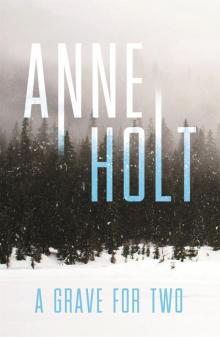 A Grave for Two
A Grave for Two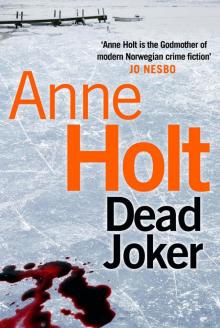 Dead Joker
Dead Joker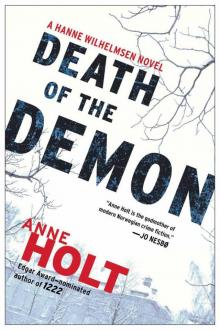 Death of the Demon: A Hanne Wilhelmsen Novel
Death of the Demon: A Hanne Wilhelmsen Novel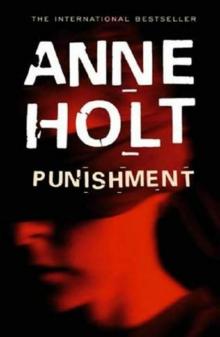 Punishment aka What Is Mine
Punishment aka What Is Mine Beyond the Truth
Beyond the Truth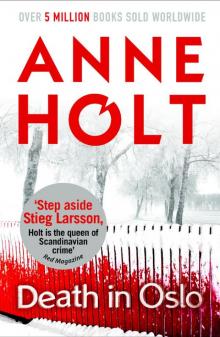 Death in Oslo
Death in Oslo The Blind Goddess
The Blind Goddess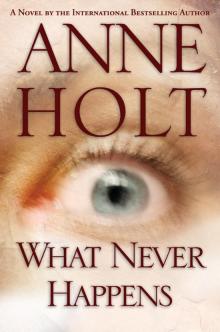 What Never Happens
What Never Happens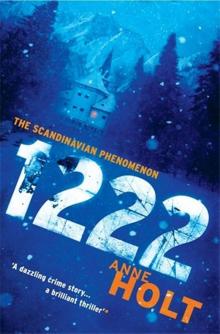 1222
1222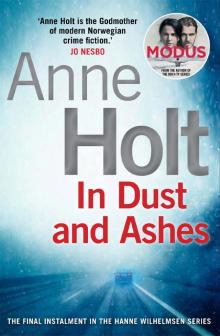 In Dust and Ashes
In Dust and Ashes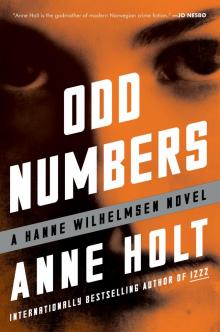 Odd Numbers
Odd Numbers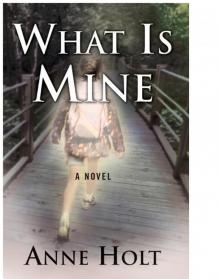 What is Mine
What is Mine What Dark Clouds Hide
What Dark Clouds Hide Blessed Are Those Who Thirst
Blessed Are Those Who Thirst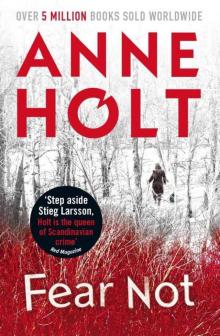 Fear Not
Fear Not No Echo
No Echo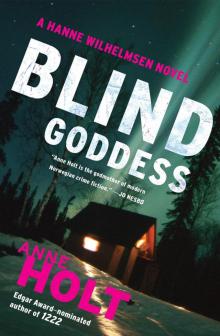 Hanne Wilhelmsen - 01 - The Blind Goddess
Hanne Wilhelmsen - 01 - The Blind Goddess